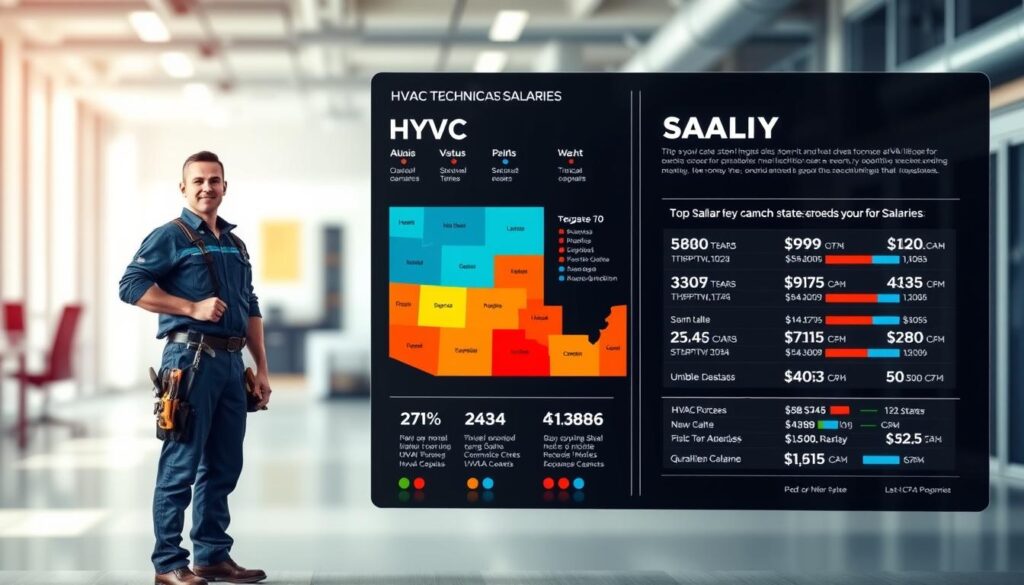Affiliate Disclosure
HVAC Guide Guys is a participant in the Amazon Services LLC Associates Program, an affiliate advertising program designed to provide a means for sites to earn advertising fees by advertising and linking to Amazon.
How Much Money Does HVAC Make a Year? Ever wondered how much HVAC technicians make? The heating, ventilation, and air conditioning field is full of promise. It offers a career path with surprising financial rewards that might change your view of skilled trades.

The U.S. Bureau of Labor Statistics says HVAC technicians made $50,590 on average in 2020. Your salary can change a lot based on your experience, where you work, and your special skills.
To really understand how much you can earn in HVAC, we need to explore the world of technical careers. This detailed salary guide will show you what to expect in an HVAC career.
Key Takeaways
- Median HVAC technician salary is $50,590 annually
- Earnings vary by experience and specialization
- Geographic location significantly impacts income
- Certifications can boost earning
- Career growth opportunities are abundant in HVAC
Table of Contents
Understanding HVAC Technician Career Earnings
Your HVAC career offers exciting financial opportunities. These grow as you gain experience and expertise. The hvac career earnings landscape is dynamic, with substantial income across different career stages.
Understanding the annual hvac earnings trajectory helps plan your professional development. Each career stage brings unique challenges and financial rewards.
Entry-Level Positions
When you start, entry-level technicians earn between $35,000 and $45,000 annually. Your initial earnings depend on several key factors:
- Geographic location
- Educational background
- Initial technical skills
- Training program completion
Mid-Career Earnings
As you develop specialized skills and gain experience, your income increases. Mid-career HVAC technicians with 2-4 years of experience can earn about $55,000 to $65,000 annually.
Senior-Level Income
Experienced HVAC professionals with 5-10 years in the field earn impressive salaries. Senior technicians often earn between $70,000 and $85,000. There are opportunities for even higher compensation through specialization and advanced certifications.
Your commitment to continuous learning and skill development directly impacts your earning in the HVAC industry.
National Average HVAC Salary Breakdown
Knowing the national average HVAC technician salary is key to understanding your earning power. HVAC professionals earn a median of $50,590 a year. This provides a strong base for growing your career and securing your financial future.
Your earnings can change a lot based on several important factors. Salaries range from about $31,000 for newbies to $80,000 for seasoned pros. This shows the many chances you have in the HVAC world.
- Entry-Level Earnings: $31,000 – $40,000
- Mid-Career Professionals: $45,000 – $65,000
- Experienced Technicians: $65,000 – $80,000
It’s not just about the base pay. Your location, the type of HVAC work you do, and extra certifications also play a big role. Places with high demand and extreme weather pay more.
“Your skills and expertise directly translate to higher earning in the HVAC industry.” – Industry Expert
Those who specialize in commercial HVAC or have advanced certifications can earn more. Investing in your skills can really pay off in the long run.
Explore Our HVAC Shop
Looking for top-rated HVAC tools, parts, and accessories? Visit our shop and find the perfect solution for your needs.
Visit the ShopHow Much Money Does HVAC Make a Year: Complete Analysis
Understanding your total HVAC compensation is more than just your base salary. HVAC technicians have many ways to earn more money each year. Let’s look at the main parts that make up a complete HVAC income package.
Your HVAC earnings depend on several key financial parts. These can help increase your total pay. HVAC professionals can boost their income in different ways.
Base Salary Components
The base salary is the starting point for HVAC earnings. It includes:
- Hourly wage rates
- Weekly guaranteed hours
- Base annual salary range
- Regular pay scale increments
Overtime Opportunities
Overtime work can greatly increase your yearly income. Peak seasons like summer and winter offer extra chances to earn more.
| Overtime Type | Potential Earnings | Frequency |
|---|---|---|
| Emergency Repairs | 1.5x Regular Rate | Weekends/Nights |
| Commercial Projects | 2x Regular Rate | Complex Installations |
| Holiday Work | 2.5x Regular Rate | Limited Availability |
Performance Bonuses
Many HVAC companies give bonuses for good performance. These can include:
- Customer satisfaction bonuses
- Successful project completion rewards
- Sales commission structures
- Safety compliance incentives
Pro tip: Developing specialized skills and maintaining high-quality work can unlock additional earning opportunities in the HVAC industry.
Top-Paying States for HVAC Technicians

Your salary as an HVAC technician can change a lot based on where you work. Some states pay HVAC pros a lot more, making where you live very important for your earnings.
The best states for HVAC techs offer great chances for high pay. These places often have a big need for skilled workers because of their tough environments.
| State | Average Annual Salary | Key Factors |
|---|---|---|
| Alaska | $75,660 | Extreme climate conditions |
| Massachusetts | $73,300 | Dense urban infrastructure |
| New Jersey | $70,500 | High population density |
| District of Columbia | $69,820 | Government and commercial projects |
| Washington | $68,940 | Technology sector growth |
It’s not just about the state you’re in. Other things like local costs, industry size, and weather also affect how much you can earn.
- Local cost of living
- Industrial infrastructure
- Seasonal climate variations
- Urban vs. rural market demand
“Location can make a substantial difference in your HVAC career earnings.” – HVAC Industry Analyst
While these states have high salaries, your own success depends on your skills, training, and who you know. Look into local job markets and keep learning to boost your earnings.
Explore Our HVAC Shop
Looking for top-rated HVAC tools, parts, and accessories? Visit our shop and find the perfect solution for your needs.
Visit the ShopExperience-Based Salary Progression
Your earnings in the HVAC field can really grow with more experience. The HVAC industry is full of chances for technicians who keep learning and improving. Knowing how much you can earn at different career levels helps you plan your future.
As you gain more experience, your salary will increase a lot. Technicians see big pay hikes as they get better at their job and learn more.
Early Career Stage: 0-5 Years
In the first 5 years, you can earn about $45,760 a year. You’ll:
- Learn basic technical skills
- Get better at installing systems
- Start to understand the industry better
- Work with different HVAC systems
Mid-Career Development: 6-9 Years
After 6-9 years, you can make about $57,512 a year. This time, you’ll:
- Get better at technical tasks
- Take on bigger projects
- Have a chance to lead
- Focus on specific HVAC areas
Experienced Professional: 10+ Years
With over 10 years of experience, you can earn around $68,286 a year. At this point, you’ll likely have:
- Deep technical knowledge
- Be great at solving problems
- Have management roles
- Get high-value consulting jobs
“Experience turns technical skills into valuable expertise in the HVAC field.” – HVAC Industry Insights
Commercial vs Residential HVAC Earnings
When looking at HVAC technician salaries, it’s key to know the difference between commercial and residential work. The pay varies a lot between these two areas of the HVAC trade income.
Commercial HVAC installers usually make more money because of the complex systems they handle. Your earnings can go up a lot by focusing on commercial installations. These jobs need advanced technical skills and specific knowledge.
- Commercial HVAC projects involve larger, more complex systems
- Residential work focuses on smaller-scale installations
- Complexity directly impacts hvac installer income
| HVAC Sector | Average Annual Salary | Skill Complexity |
|---|---|---|
| Residential HVAC | $52,000 | Moderate |
| Commercial HVAC | $68,500 | High |
Your career path greatly affects your earnings. Commercial HVAC technicians often need extra certifications and advanced training. This means they get paid more.
“Specialization is key to maximizing your HVAC trade income.” – HVAC Industry Expert
Deciding between commercial and residential HVAC work depends on your skills, interests, and career goals. Both paths offer great opportunities for skilled professionals who keep learning and growing.
Certification Impact on HVAC Salaries
Getting professional certifications can really boost your hvac technician salary. It also opens up more earning possibilities. Specialized credentials show you’re an expert and can lead to better pay in the HVAC field.
Professional certifications are smart investments in your career. They prove your skills, boost your value in the job market, and can raise your earnings.
EPA 608 Certification Benefits
The EPA 608 Certification is key for HVAC pros working with refrigeration. It has many benefits:
- It keeps you in line with federal rules.
- It makes you more employable.
- It can raise your salary by 5-10%.
- It opens up more job chances.
NATE Certification Value
NATE (North American Technician Excellence) certification is the top credential in HVAC. Technicians with NATE can look forward to:
- Starting with higher wages.
- Being seen as more credible by employers.
- Getting recognized for their advanced skills.
Additional Specialized Certifications
There are also specialized certifications that can increase your earnings:
| Certification | Potential Salary Increase |
|---|---|
| Commercial Refrigeration | 7-12% |
| Industrial Controls | 10-15% |
| Energy Management | 5-8% |
Investing in professional development through targeted certifications can change your HVAC career and earnings.
Explore Our HVAC Shop
Looking for top-rated HVAC tools, parts, and accessories? Visit our shop and find the perfect solution for your needs.
Visit the ShopGeographic Salary Variations

Your hvac technician salary can change a lot based on where you work. The place you work in greatly affects how much you can earn. This is true all over the United States.
Different places have their own pay scales. These are based on the local economy, how much HVAC services are needed, and the cost of living. Cities usually pay more than rural areas because they need more complex services.
- West Coast states like California offer premium salaries
- Southwestern states demonstrate steady HVAC wage
- Northeastern metropolitan areas provide competitive compensation packages
Salaries can differ by $10,000 to $25,000 a year. For example, an HVAC technician in San Francisco might make a lot more than one in a small Midwestern city.
“Location is everything in determining your HVAC career earnings” – HVAC Industry Expert
Several things affect how much you can earn in different places:
- Local economic strength
- Population density
- Construction and infrastructure development
- Energy sector activities
Knowing these differences can help you plan your HVAC career better. It can also help you make more money.
Career Growth and Income
Your earnings in the HVAC field can soar as you gain more experience and skills. The HVAC industry has many paths for those who want to earn more. This includes roles that offer higher salaries and more opportunities for growth.
HVAC technicians can see a big jump in their earnings by moving up in their careers. Some key ways to do this include:
- Supervisory roles with higher salaries
- Specialized technical positions
- Business ownership
- Training and education roles
As you become more skilled, your pay can go up a lot. You can move into management jobs or even start your own HVAC business. This can lead to even higher earnings.
| Career Stage | Potential Role | Average Earnings |
|---|---|---|
| Entry Level | Technician | $45,000-$55,000 |
| Mid-Career | Senior Technician | $65,000-$75,000 |
| Advanced | HVAC Manager | $85,000-$95,000 |
By always learning and getting new certifications, you can increase your earnings in HVAC. Specializing in new technologies can also help you earn more.
Explore Our HVAC Shop
Looking for top-rated HVAC tools, parts, and accessories? Visit our shop and find the perfect solution for your needs.
Visit the ShopIndustry Trends Affecting HVAC Wages
The HVAC industry is changing a lot, affecting hvac technician salary and wage. Knowing these trends can help you grow in your career and increase your earnings.
Environmental Regulations Driving Change
Environmental rules are changing the HVAC world. Green energy is making technicians learn about energy-saving systems. This opens up new chances for those who can work with green tech.
- More demand for eco-friendly HVAC solutions
- Focus on cutting down carbon emissions
- Certifications needed for new environmental standards
Technological Advancements Reshaping Skills
Smart tech is changing the HVAC field. Technicians who learn digital skills and understand new control systems will earn more. Knowing the latest tech is a big plus.
- IoT-enabled HVAC systems
- Advanced diagnostic tools
- Remote monitoring tech
Evolving Market Demand
The HVAC market is growing fast, with big growth expected. Homes and businesses need experts in energy-saving systems. Being able to adapt will boost your earnings.
Keeping up with learning and skills is essential to stay ahead in HVAC.
Conclusion
The HVAC industry is a promising field for those looking for stable and rewarding careers. Knowing how much money HVAC professionals make shows it’s a field with great earning possibilities. Your earnings can grow based on several factors like certifications, location, and specialized skills.
HVAC career earnings change with new technologies and market needs. By keeping up with education and getting certifications like EPA 608 and NATE, you can boost your earnings. Staying updated with industry trends and adapting to new technologies can lead to better pay.
Your location and the type of projects you take on can greatly affect your income. Places like California, New York, and Texas have strong markets with good pay for skilled workers. Growing your skills, staying updated, and understanding HVAC systems are key to increasing your earnings over time.
The future of HVAC careers is bright, with more demand for energy-efficient solutions and skilled workers. By planning your career well, you can build a successful and profitable career in this important field. Your earning growth depends on your dedication, skills, and openness to new technologies.

